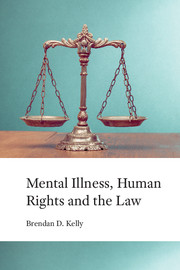Book contents
- Frontmatter
- Contents
- Foreword
- Preface
- Acknowledgements
- List of boxes
- List of legislation, treaties and conventions
- List of cases
- 1 Human rights and mental illness
- 2 Mental Health Acts 1983 and 2007: England and Wales
- 3 Fusing mental health and capacity legislation: Northern Ireland
- 4 Mental Health Act 2001: Ireland
- 5 The challenges of reform: Scotland
- 6 Structural violence, power and mental illness
- 7 Conclusions: fighting for rights
- Notes
- References
- Index
- Frontmatter
- Contents
- Foreword
- Preface
- Acknowledgements
- List of boxes
- List of legislation, treaties and conventions
- List of cases
- 1 Human rights and mental illness
- 2 Mental Health Acts 1983 and 2007: England and Wales
- 3 Fusing mental health and capacity legislation: Northern Ireland
- 4 Mental Health Act 2001: Ireland
- 5 The challenges of reform: Scotland
- 6 Structural violence, power and mental illness
- 7 Conclusions: fighting for rights
- Notes
- References
- Index
Summary
This is a book about psychiatry, mental illness and human rights. It is also, unashamedly, a manifesto for change, urging reconsideration of the ways in which the human rights of people with mental illness are protected and promoted, and urging social activism in addition to enhanced psychiatric care.
As is both traditional and necessary, much of this book explores legislative provisions relating to the right to liberty among people with mental illness. In the complicated, contested setting of mental healthcare, it is clearly essential that involuntary detention and treatment are appropriately regulated and monitored, so as to preserve this fundamental right. The opening chapters of this book duly examine legislation relating to these matters in some detail, in England and Wales, Northern Ireland, the Republic of Ireland and Scotland.
An exclusive focus on the right to liberty alone, however, fails to address or even acknowledge a range of broader social injustices and denials of rights commonly experienced by people with enduring mental illness (Kelly, 2007a). This book takes this broader perspective strongly to heart, especially in the closing chapters, which are devoted to achieving social justice for the mentally ill and practical steps towards effecting change.
Chapter 1 sets the scene by considering the emergence of the idea of human rights in the first instance and the relationship between human rights and mental illness. This chapter also explores the United Nations (UN) Universal Declaration of Human Rights (UN, 1948) and eventual recognition of the particular importance of human rights in the context of mental illness in the late 20th century. Key provisions of the legally binding European Convention on Human Rights (ECHR) (Council of Europe, 1950) are outlined next, along with measures to incorporate the ECHR into national law in the UK (Human Rights Act 1998) and Ireland (European Convention on Human Rights Act 2003).
It is the ECHR that has produced the greatest shift in thinking in this area, with a series of judgments that strongly re-emphasised various protections for the rights of the detained mentally ill, especially in relation to humane conditions in therapeutic settings and prompt, effective reviews. As is the case throughout this book, the examination of case law in this chapter is thematic rather than exhaustive; more detailed accounts of case law are available elsewhere (e.g. Bartlett & Sandland, 2014).
- Type
- Chapter
- Information
- Mental Illness, Human Rights and the Law , pp. xi - xivPublisher: Royal College of PsychiatristsPrint publication year: 2016



